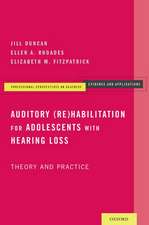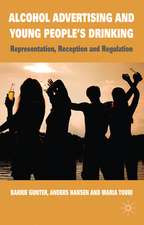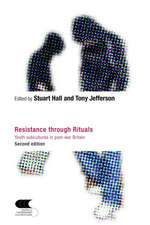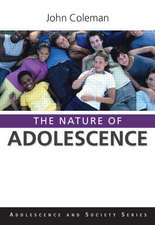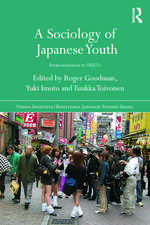Intense Years: How Japanese Adolescents Balance School, Family and Friends: Reference Books In International Education
Autor Gerald K. Letendre, Rebecca Erwin Fukuzawaen Limba Engleză Paperback – 13 mai 2016
| Toate formatele și edițiile | Preț | Express |
|---|---|---|
| Paperback (1) | 309.69 lei 6-8 săpt. | |
| Taylor & Francis – 13 mai 2016 | 309.69 lei 6-8 săpt. | |
| Hardback (1) | 697.53 lei 6-8 săpt. | |
| Taylor & Francis – 27 apr 2001 | 697.53 lei 6-8 săpt. |
Din seria Reference Books In International Education
- 18%
 Preț: 1060.43 lei
Preț: 1060.43 lei -
 Preț: 354.94 lei
Preț: 354.94 lei - 15%
 Preț: 209.80 lei
Preț: 209.80 lei -
 Preț: 404.24 lei
Preț: 404.24 lei - 18%
 Preț: 1277.66 lei
Preț: 1277.66 lei -
 Preț: 442.50 lei
Preț: 442.50 lei -
 Preț: 475.65 lei
Preț: 475.65 lei -
 Preț: 309.69 lei
Preț: 309.69 lei -
 Preț: 442.50 lei
Preț: 442.50 lei -
 Preț: 442.50 lei
Preț: 442.50 lei -
 Preț: 198.19 lei
Preț: 198.19 lei - 18%
 Preț: 929.88 lei
Preț: 929.88 lei -
 Preț: 475.65 lei
Preț: 475.65 lei -
 Preț: 442.50 lei
Preț: 442.50 lei -
 Preț: 442.50 lei
Preț: 442.50 lei - 19%
 Preț: 234.90 lei
Preț: 234.90 lei -
 Preț: 419.55 lei
Preț: 419.55 lei -
 Preț: 442.50 lei
Preț: 442.50 lei -
 Preț: 369.73 lei
Preț: 369.73 lei - 18%
 Preț: 1013.04 lei
Preț: 1013.04 lei - 14%
 Preț: 318.40 lei
Preț: 318.40 lei - 18%
 Preț: 999.51 lei
Preț: 999.51 lei - 17%
 Preț: 142.32 lei
Preț: 142.32 lei - 18%
 Preț: 1065.40 lei
Preț: 1065.40 lei -
 Preț: 422.59 lei
Preț: 422.59 lei -
 Preț: 211.47 lei
Preț: 211.47 lei -
 Preț: 309.69 lei
Preț: 309.69 lei -
 Preț: 422.59 lei
Preț: 422.59 lei -
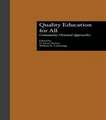 Preț: 442.50 lei
Preț: 442.50 lei - 15%
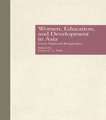 Preț: 699.01 lei
Preț: 699.01 lei -
 Preț: 421.61 lei
Preț: 421.61 lei - 25%
 Preț: 766.66 lei
Preț: 766.66 lei -
 Preț: 482.57 lei
Preț: 482.57 lei - 18%
 Preț: 1224.24 lei
Preț: 1224.24 lei
Preț: 309.69 lei
Nou
Puncte Express: 465
Preț estimativ în valută:
59.27€ • 61.65$ • 48.93£
59.27€ • 61.65$ • 48.93£
Carte tipărită la comandă
Livrare economică 14-28 aprilie
Preluare comenzi: 021 569.72.76
Specificații
ISBN-13: 9781138992566
ISBN-10: 1138992569
Pagini: 152
Dimensiuni: 152 x 229 mm
Greutate: 0.21 kg
Ediția:1
Editura: Taylor & Francis
Colecția Routledge
Seria Reference Books In International Education
Locul publicării:Oxford, United Kingdom
ISBN-10: 1138992569
Pagini: 152
Dimensiuni: 152 x 229 mm
Greutate: 0.21 kg
Ediția:1
Editura: Taylor & Francis
Colecția Routledge
Seria Reference Books In International Education
Locul publicării:Oxford, United Kingdom
Notă biografică
Gerald Letendre is Assistant Professor, Educational Policy, Pennsylvania State. He has most recently published (with Thomas Rohlen) Teaching and Learning in Japan (Cambridge U P, 1996). He received his Ph.D. in education from Stanford University and his M.A. in sociology from Stanford as well. Rebecca Fukuzawa received a Ph.D. in Anthropology from Northwestern University and is currently Lecturer at Tokyo University.
Recenzii
"Fukuzawa and LeTendre offer the reader a new perspective on Japanese education and soceity that demonstrates the successess and problems faced by Japanese students, parents and teachers." -- Addescene
"Intense Years significantly contributes to our understanding of how the Japanese education system is being transformed and the kind of social change that Japan is currently undergoing.the authors convincingly convey the sense that the problems contemporary Japanese adolescents are reported to face are not due to one specific cause. Therefore, there is no single, definite answer to their problems. Rather, their problems derive from a number of external and internal factors including the changing economy, society, and global environment, which all influence in one way or another the experiences of adolescents." -- McGill Journal of Education, Volume 36, Number 3, Fall 2001
"In contrast with many authors who write about Japan by either idealizing or vilifying it, Intense Years neither suggests that the Japanese school system should be a model for schools in the rest of the world, nor do the authors point out the weaknesses of the Japanese school system in order to convey the underlying message that American (or other) schools and, thus, American (or other) societies, are superior to Japanese schools and society. They discuss the internal logic of as well as inconsistencies in the world of Japanese middle schools, using well-chosen quotes that allow the reader to get a sense of the people who are the topic of this project. They portray the points of view of students, parents, and middle school faculty, and describe the ubiquitous private schools, which provide after-school tutoring (and childcare) for those on the academic fast track, and for others who do not want to fall behind." -- Anthropology & Education Quarterly, October 30, 2001
"The authors have a thorough knowledge of rural and urban Japanese middle schools based on many years of structured research and participant observation. would make a fine supplementary text for classes on contemporary Japan, for it provides a wealth of theoretically situated information, and is also a great read. A final strength of the book is that the authors care deeply for middle school students." -- Guven Peter Witteveen, Anthropology & Education Quarterly, December 2001
"Intense Years would make a fine supplementary text for classes on contemporary Japan, for it provides a wealth of theoretically situated information, and is also a great read. A final strength of the book is that the authors care deeply for middle school students." -- Anthropology & Education Quarterly, October 30, 2001
"Intense Years significantly contributes to our understanding of how the Japanese education system is being transformed and the kind of social change that Japan is currently undergoing.the authors convincingly convey the sense that the problems contemporary Japanese adolescents are reported to face are not due to one specific cause. Therefore, there is no single, definite answer to their problems. Rather, their problems derive from a number of external and internal factors including the changing economy, society, and global environment, which all influence in one way or another the experiences of adolescents." -- McGill Journal of Education, Volume 36, Number 3, Fall 2001
"In contrast with many authors who write about Japan by either idealizing or vilifying it, Intense Years neither suggests that the Japanese school system should be a model for schools in the rest of the world, nor do the authors point out the weaknesses of the Japanese school system in order to convey the underlying message that American (or other) schools and, thus, American (or other) societies, are superior to Japanese schools and society. They discuss the internal logic of as well as inconsistencies in the world of Japanese middle schools, using well-chosen quotes that allow the reader to get a sense of the people who are the topic of this project. They portray the points of view of students, parents, and middle school faculty, and describe the ubiquitous private schools, which provide after-school tutoring (and childcare) for those on the academic fast track, and for others who do not want to fall behind." -- Anthropology & Education Quarterly, October 30, 2001
"The authors have a thorough knowledge of rural and urban Japanese middle schools based on many years of structured research and participant observation. would make a fine supplementary text for classes on contemporary Japan, for it provides a wealth of theoretically situated information, and is also a great read. A final strength of the book is that the authors care deeply for middle school students." -- Guven Peter Witteveen, Anthropology & Education Quarterly, December 2001
"Intense Years would make a fine supplementary text for classes on contemporary Japan, for it provides a wealth of theoretically situated information, and is also a great read. A final strength of the book is that the authors care deeply for middle school students." -- Anthropology & Education Quarterly, October 30, 2001
Cuprins
The Context of Schooling 1. Life in the Classroom; 2. The Academic Curriculum; 3. The Social Curriculum: Counselling, Guidance, and Planning for the Future; Peer Relations and Maturation . 1. Peers and Friendships: Groups and Expanding Social Networks (Committees, Clubs, Events); 2. Girls and Boys: Development of Gender Differences; 3. Adjustment: Problems In School and Out; Relations With Adults 1. Teachers and Coaches; 2. Parents, Families and their Relation to School; 3. Exams, Juku, and the Pressure to Advance in School; Conclusion: A Question of Balance Appendix I: Field Sites and Data Collection; Appendix II: Japanese Terms

